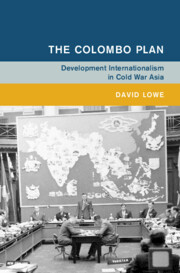
-
Select format
-
- Publisher:
- Cambridge University Press
- Publication date:
- 09 October 2025
- 02 October 2025
- ISBN:
- 9781009600729
- 9781009600736
- Dimensions:
- (228 x 152 mm)
- Weight & Pages:
- 0.62kg, 320 Pages
- Dimensions:
- Weight & Pages:
You may already have access via personal or institutional login- Series:
- Global and International History
Book description
Conceived in 1950, the Colombo Plan for Co-operative Development in South and Southeast Asia was a unique experiment in foreign relations. Meeting annually across what we now know as the 'Indo-Pacific', talented administrators facilitated foreign aid provision, and promoted development fuelled state-making, internationalism and experimental regionalism across postwar Asia. David Lowe argues that this new setting and dynamic international cast created an unusually productive diplomatic environment of development internationalism. The Colombo Plan did not escape power politics or Cold War divisions. However, it did run according to its own rhythm, and, unlike other experiments, it endured, continuing today in much reduced form.
Reviews
‘Lowe's study demonstrates an alternative channel of the voices of the post-independent countries of Asia to the A-A movement of the Bandung Conference (1955). It identifies the Columbo Plan's Consultative Committee as a fora-based international organization grown beyond the original Commonwealth base, where these countries, especially India and Sri Lanka, shaped external and intra-regional aid projects. A great contribution to the growing literature on the history of international development.'
Tomoko Akami - ANU College of Asia and the Pacific
‘This is a stimulating story of a newly formed Commonwealth-based development organization, the Colombo Plan, and its enduring impacts on the emerging ‘Indo-Pacific' region in the long 1950s. We can identify the dynamic interactions between decolonization, the Cold War and economic development in Asia in the context of global history.'
Shigeru Akita - Osaka University, Japan
‘Lowe expertly reveals the operations and machinations of 'development internationalism,' through the overlooked yet enduring Colombo Plan, exposing how various countries harnessed the program as more than a simple vehicle for aid but a means to reshape international relationships in the Indo-Pacific and beyond in the critical years after 1945.'
David Ekbladh - Fletcher School of Law and Diplomacy
Contents
Metrics
Altmetric attention score
Full text views
Full text views help Loading metrics...
Loading metrics...
* Views captured on Cambridge Core between #date#. This data will be updated every 24 hours.
Usage data cannot currently be displayed.
Accessibility standard: Missing or limited accessibility features
Why this information is here
This section outlines the accessibility features of this content - including support for screen readers, full keyboard navigation and high-contrast display options. This may not be relevant for you.
Accessibility Information
The PDF of this book is known to have missing or limited accessibility features. We may be reviewing its accessibility for future improvement, but final compliance is not yet assured and may be subject to legal exceptions. If you have any questions, please contact accessibility@cambridge.org.
Content Navigation
Table of contents navigation
Allows you to navigate directly to chapters, sections, or non‐text items through a linked table of contents, reducing the need for extensive scrolling.
Index navigation
Provides an interactive index, letting you go straight to where a term or subject appears in the text without manual searching.
Reading Order and Textual Equivalents
Single logical reading order
You will encounter all content (including footnotes, captions, etc.) in a clear, sequential flow, making it easier to follow with assistive tools like screen readers.
Full alternative textual descriptions
You get more than just short alt text: you have comprehensive text equivalents, transcripts, captions, or audio descriptions for substantial non‐text content, which is especially helpful for complex visuals or multimedia.
Visualised data also available as non‐graphical data
You can access graphs or charts in a text or tabular format, so you are not excluded if you cannot process visual displays.
Visual Accessibility
Use of colour is not sole means of conveying information
You will still understand key ideas or prompts without relying solely on colour, which is especially helpful if you have colour vision deficiencies.
Use of high contrast between text and background colour
You benefit from high‐contrast text, which improves legibility if you have low vision or if you are reading in less‐than‐ideal lighting conditions.

